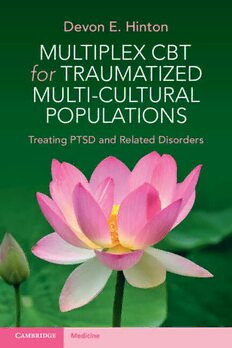
Multiplex CBT for Traumatized Multi-Cultural Populations PDF
Preview Multiplex CBT for Traumatized Multi-Cultural Populations
Multiplex CBT for Traumatized Multicultural Populations Downloaded from https://www.cambridge.org/core. Southern Cross University, on 15 Jun 2022 at 06:18:17, subject to the Cambridge Core terms of use, available at https://www.cambridge.org/core/terms. https://doi.org/10.1017/9781009072458 Downloaded from https://www.cambridge.org/core. Southern Cross University, on 15 Jun 2022 at 06:18:17, subject to the Cambridge Core terms of use, available at https://www.cambridge.org/core/terms. https://doi.org/10.1017/9781009072458 Multiplex CBT for Traumatized Multicultural Populations Treating PTSD and Related Disorders Devon E. Hinton HarvardMedicalSchool Downloaded from https://www.cambridge.org/core. Southern Cross University, on 15 Jun 2022 at 06:18:17, subject to the Cambridge Core terms of use, available at https://www.cambridge.org/core/terms. https://doi.org/10.1017/9781009072458 UniversityPrintingHouse,CambridgeCB28BS,UnitedKingdom OneLibertyPlaza,20thFloor,NewYork,NY10006,USA 477WilliamstownRoad,PortMelbourne,VIC3207,Australia 314–321,3rdFloor,Plot3,SplendorForum,JasolaDistrictCentre, NewDelhi–110025,India 103PenangRoad,#05–06/07,VisioncrestCommercial,Singapore238467 CambridgeUniversityPressispartoftheUniversityofCambridge. ItfurtherstheUniversity’smissionbydisseminatingknowledgeinthepursuitof education,learning,andresearchatthehighestinternationallevelsofexcellence. www.cambridge.org Informationonthistitle:www.cambridge.org/9781009073394 DOI:10.1017/9781009072458 ©CambridgeUniversityPress2022 Thispublicationisincopyright.Subjecttostatutoryexception andtotheprovisionsofrelevantcollectivelicensingagreements, noreproductionofanypartmaytakeplacewithoutthewritten permissionofCambridgeUniversityPress. Firstpublished2022 PrintedinGreatBritainbyAshfordColourPressLtd. AcataloguerecordforthispublicationisavailablefromtheBritishLibrary. LibraryofCongressCataloging-in-PublicationData Names:Hinton,DevonE.author. Title:MultiplexCBTfortraumatizedmulticulturalpopulations:treating PTSDandrelateddisorders/DevonE.Hinton. Description:NewYork,NY:CambridgeUniversityPress,2022.|Includes bibliographicalreferencesandindex. Identifiers:LCCN2021051452(print)|LCCN2021051453(ebook)| ISBN 9781009073394(paperback)|ISBN9781009072458(ebook) Subjects:MESH:CognitiveBehavioralTherapy–methods|StressDisorders, Traumatic–therapy|CulturallyCompetentCare–methods|Minority Groups–psychology|Refugees–psychology|BISAC:PSYCHOLOGY/Mental Health Classification:LCCRC552.P67(print)|LCCRC552.P67(ebook)|NLMWM 425.5.C6|DDC616.85/21–dc23/eng/20211124 LCrecordavailableathttps://lccn.loc.gov/2021051452 LCebookrecordavailableathttps://lccn.loc.gov/2021051453 ISBN978-1-009-07339-4Paperback CambridgeUniversityPresshasnoresponsibilityforthepersistenceoraccuracyof URLsforexternalorthird-partyinternetwebsitesreferredtointhispublication anddoesnotguaranteethatanycontentonsuchwebsitesis,orwillremain, accurateorappropriate. Everyefforthasbeenmadeinpreparingthisbooktoprovideaccurateandup-to-dateinformationthat isinaccordwithacceptedstandardsandpracticeatthetimeofpublication.Althoughcasehistoriesare drawnfromactualcases,everyefforthasbeenmadetodisguisetheidentitiesoftheindividualsinvolved. Nevertheless,theauthors,editors,andpublisherscanmakenowarrantiesthattheinformation containedhereinistotallyfreefromerror,notleastbecauseclinicalstandardsareconstantlychanging throughresearchandregulation.Theauthors,editors,andpublishersthereforedisclaimallliabilityfor directorconsequentialdamagesresultingfromtheuseofmaterialcontainedinthisbook.Readersare stronglyadvisedtopaycarefulattentiontoinformationprovidedbythemanufacturerofanydrugsor equipmentthattheyplantouse. Downloaded from https://www.cambridge.org/core. Southern Cross University, on 15 Jun 2022 at 06:18:17, subject to the Cambridge Core terms of use, available at https://www.cambridge.org/core/terms. https://doi.org/10.1017/9781009072458 Contents TherapistIntroduction 1 Session8: EducationAboutBreathing andItsUsefor Session1: EducationAbout Relaxation 97 Trauma-RelatedDisorder andtheIntroductionof Session9: SleepDisturbance 109 EmotionRegulation Session10: WorryandGeneralized Techniques 25 AnxietyDisorder 122 Session2: AppliedStretchingandthe Session11: AngerandAnger Toe-to-HeadMuscle Protocol 136 Relaxationwith Visualization 37 Session12: SomaticSymptomsIand Review 142 Session3: ReviewoftheToe-to-Head MuscleRelaxationwith Session13: SomaticSymptomsIIand Visualizationandthe Review 152 IntroductionoftheAnxiety Session14: CulturalSyndromesand Protocol 45 FinalReview 162 Session4: EducationAboutTrauma andIntroductionofthe Trauma-RecallProtocol (TRP) 53 AppendixA:StretchingHandout 174 Session5: EducationAbout AppendixB:Toe-to-HeadRelaxation Trauma-RelatedDisorder, withVisualization 177 ModificationofCatastrophic AppendixC:AnxietyProtocol 184 Cognitions,andTeaching AppendixD:Trauma-Recall EmotionalDistancing 61 Protocol 186 AppendixE:AngerProtocol(Anger Session6: InteroceptiveExposurewith Toolbox) 192 ReassociationI:Head AppendixF:TheWorry Rotation 72 Questionnaire 198 Session7: InteroceptiveExposurewith AppendixG:“ThinkingaLot” ReassociationII: Questionnaire 207 Hyperventilation 84 Index 217 v Downloaded from https://www.cambridge.org/core. Southern Cross University, on 15 Jun 2022 at 06:18:16, subject to the Cambridge Core terms of use, available at https://www.cambridge.org/core/terms. https://doi.org/10.1017/9781009072458 Downloaded from https://www.cambridge.org/core. Southern Cross University, on 15 Jun 2022 at 06:18:16, subject to the Cambridge Core terms of use, available at https://www.cambridge.org/core/terms. https://doi.org/10.1017/9781009072458 Therapist Introduction Why Use This Treatment Unique Challenges in Treating Minority and Refugee Populations Thetreatmentoftraumatizedethnicminoritiesandrefugeespresentsextensivechallenges. TheyoftenhavepoorEnglishfluencyandminimaleducation,andmanyhaveahistoryof extensivetraumasandaredealingwithseveraltypesofstress,suchasadaptingtoadiffering sociocultural context and living in poor urban areas with high levels of crime (Hinton & Lewis-Fernández,2011).Owingtoelevatedstressandtrauma,thesegroupstendtohavenot onlyPTSDbutalsoelevatedratesofsomaticcomplaints,comorbidanxietydisorders,and anxiety-type psychopathological processes such as worry, rumination, and panic attacks (Hinton & Lewis-Fernández, 2011; Hinton, Pich, Marques, Nickerson, & Pollack, 2010); anotherdisorderofarousal,anger,isalsoamajortreatmentissueinthesegroups(Hinton, Rasmussen, Nou, Pollack, & Good, 2009). The resulting symptoms often give rise to catastrophic cognitions about the meaning of the symptom, such as attribution to a feared cultural syndrome or interpretation in terms of other culturally specific beliefs. Asanadditionaltreatmentchallenge,thesegroupsoftenpoorlytolerateexposure(Lester, Resick,Young-Xu,&Artz,2010;Markowitz,2010). ff How Culturally Adapted Multiplex CBT Di ers from Other Treatments Toaddressthesetherapeuticchallenges,wehavecreatedatreatmentforPTSDthatdiffersin several ways from other standard treatment packages (Foa & Rothbaum, 1998; Resick & Schnicke,1996).Thetreatmentisbasedonthemultiplexmodelofthegenerationoftrauma- relateddistress(Figure1).Thismodelwasdevelopedbasedonclinicalworkwithtrauma- tized refugees with prominent somatic complaints and multiple comorbidities such as PTSD, GAD, panic, and anger. We have explored this model of psychopathology and its relevanceforminorityandrefugeepopulationsinmultiplestudies(Hinton&Good,2016; Hinton, Hinton, Loeum, & Pollack, 2008; Hinton, Hofmann, Pitman, Pollack, & Barlow, 2008;Hinton&Jalal,2019;Hinton&Lewis-Fernández,2011;Hinton,Nickerson,&Bryant, 2011; Hinton & Patel, 2017; Hinton, Pich, Chhean, Pollack, & Barlow, 2004; Hinton & Simons,2015).Thetreatmentaimstotargetpsychopathologicalprocessesidentifiedinthis model.Also,itsefficacyhasbeenshowninmultipletreatmenttrials(seesection“Efficacyof CulturallyAdapted[CA]MultiplexCBT”). The treatment targets arousal and triggers of arousal such as pathological worry. Itaddressestraumaassociationsandcatastrophiccognitions.Itteachesemotionregulation, includingemotionregulationthroughsomaticregulation.Thetreatmentisasomatic-focused 1 Downloaded from https://www.cambridge.org/core. Southern Cross University, on 15 Jun 2022 at 06:18:18, subject to the Cambridge Core terms of use, available at https://www.cambridge.org/core/terms. https://doi.org/10.1017/9781009072458.001 al s u o ar e or M s m o pt m y s s n otion adaptationative affect, and psychological inflexibility) Trauma memorytriggered by somatic and mental Somatic and mental distress(e.g., dizziness, poor concentration,anger) Catastrophic cognitioabout somatic andmental symptoms mg e en Poor (poor emotion regulation skills, Triggers of somatic and mental distress Worry Negative emotions (anxiety, depression, fear, anger) Stress Interpersonal conflict Arousal Bereavement-type (recalling the deceased or others from whomone is separated) Trauma-type (trauma recall, startle, hypervigilance) Panic-type (exertional intolerance, hyperventilation and chestbreathing, motion sickness [e.g., traveling in a car], agoraphobia-like syndromes [e.g., public spaces], out-of-blue autonomic surge) Sleep-related phenomena (e.g., poor sleep, nightmare, sleepparalysis, nocturnal panic) Metaphor-guided somatization (e.g., through cognizing distress insomatic metaphors) Hypervigilant surveying of the mind and body for evidence of asyndrome (e.g., “heart disease”) gure1TheMultiplexModeloftheGenerationofTrauma-RelatedDisorder (cid:129) (cid:129) (cid:129) (cid:129) (cid:129) (cid:129) (cid:129) (cid:129) (cid:129) (cid:129) (cid:129) Fi Downloaded from https://www.cambridge.org/core. Southern Cross University, on 15 Jun 2022 at 06:18:18, subject to the Cambridge Core terms of use, available at https://www.cambridge.org/core/terms. https://doi.org/10.1017/9781009072458.001 TherapistIntroduction 3 therapy:itaimstodecreasesomaticdistress(e.g.,throughappliedstretching)anditfocuses onsomaticexperiencinginteachingemotionregulation(e.g.,throughappliedstretchingand sensorial-typemindfulness).Thetreatmentimprovesemotionadaptationbytargetingwhat mightbecalledthepooremotionadaptationtriad–namely,pooremotionalregulationskills, excessivenegativeaffect,andpoorpsychologicalflexibility.Forexample,thetreatmentaims toteachemotionregulationskills,suchasthroughanemotionalregulationprotocoltaughtat thebeginningofsessions;toimprovetheemotionalrepertoire,suchasbyteachingequanim- ity and loving kindness; and to induce a positive mood-state focused on psychological flexibility, such as through enminding and embodying flexibility metaphors. Hence, the treatmentmightbecalledasomatic-focusedemotional-regulationtherapythatisculturally adapted,or,giventheemphasisonflexibilityinthepsychologicaldomainandthe physical domain(e.g.,stretching),aflexibility-focusedCBTthatisculturallyadapted. Culturallyadapted(CA)MultiplexCBThasmanyaspectsthatmakeitwellacceptedby, andefficaciousfor,minorityandrefugeepopulations,asoutlinedinTable1.CAMultiplex Table1 SomeaspectsofCAMultiplexCBTthatmakeitefficaciousandculturallyappropriate Treatmentgoal Examplesofhowthetreatmentgoalisaccomplished Acceptabilityfor (cid:129) Presentinginstructionandinformationinawaythatiseasily thosewithpoor understood Englishskills, (cid:129) Teachingemotionandsomaticregulationtechniquesthatareeasily minimaleducation, done,suchasappliedstretching,decentering/distancing,and andunfamiliarity meditation withWestern (cid:129) Framingtreatmentasaddressingcomplaintsofkeyconcern,suchas psychological somaticsymptoms concepts Positiveexpectancy (cid:129) Usingculturallyappropriateanalogies:comparingthetreatment andtreatment stepstothestepsneededtomakeafavoritedishinthatgroup credibility (cid:129) Indicatingthattreatmentaddresseskeyconcerns,suchassomatic complaintsandculturalsyndromes(e.g.,amongCambodianrefugees suchculturalsyndromesaskhyâlattacks,“weakheart,”and“thinking alot”) Reductionof (cid:129) AddressingcatastrophiccognitionsaboutPTSDandanxiety catastrophic symptoms,includingculturallyspecificcatastrophiccognitions cognitionsabout (cid:129) Specificallyelicitingthepatient’sunderstandingofsymptomsand PTSDandother alleviatingthepatient’sconcernsaboutthosesymptoms,suchasby anxietysymptoms explaininghowthesymptomsarisefromanxietyanddonotindicate aculturalsyndromeorothercatastrophe Reductionof (cid:129) Decreasingtriggersofarousal,suchasworry somaticsymptoms (cid:129) Teachingtechniquestoreducesomaticsymptomsandarousal (seealsoTable2) (cid:129) Addressingcatastrophiccognitionsaboutsomaticsymptoms (cid:129) Exploringtraumaassociationstosomaticsymptoms Reductionof (cid:129) Addressinginsomniaandvarioussleepdisorders,suchasnightmares sleep-related andsleep-relatedphenomenaandassociatedculturalmeanings(in problems manyculturalgroupssleepdisordersarequiteprominentandhave extensivemeanings) Downloaded from https://www.cambridge.org/core. Southern Cross University, on 15 Jun 2022 at 06:18:18, subject to the Cambridge Core terms of use, available at https://www.cambridge.org/core/terms. https://doi.org/10.1017/9781009072458.001
